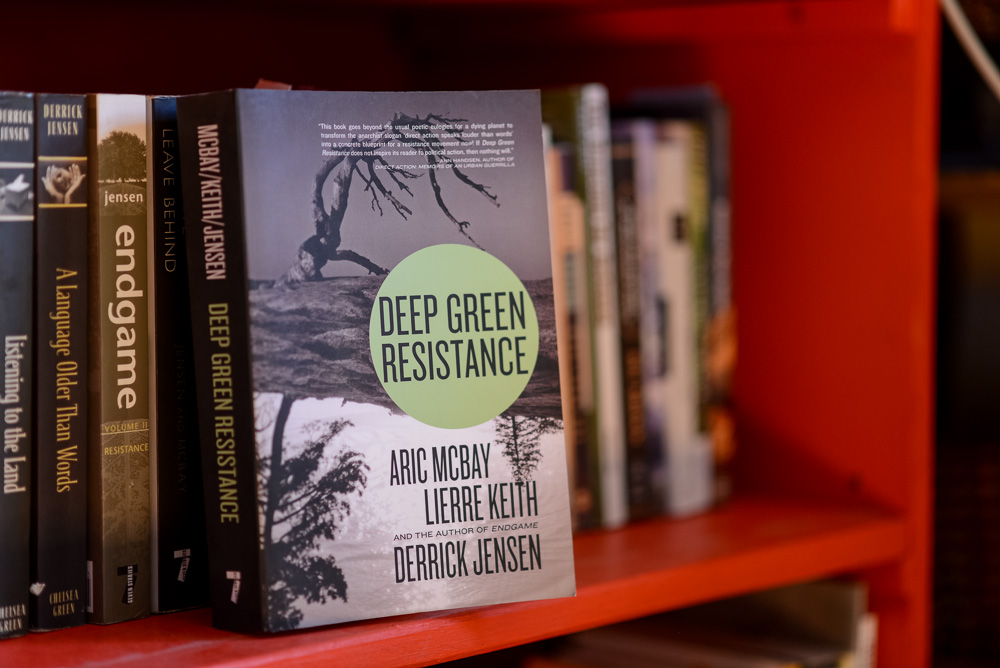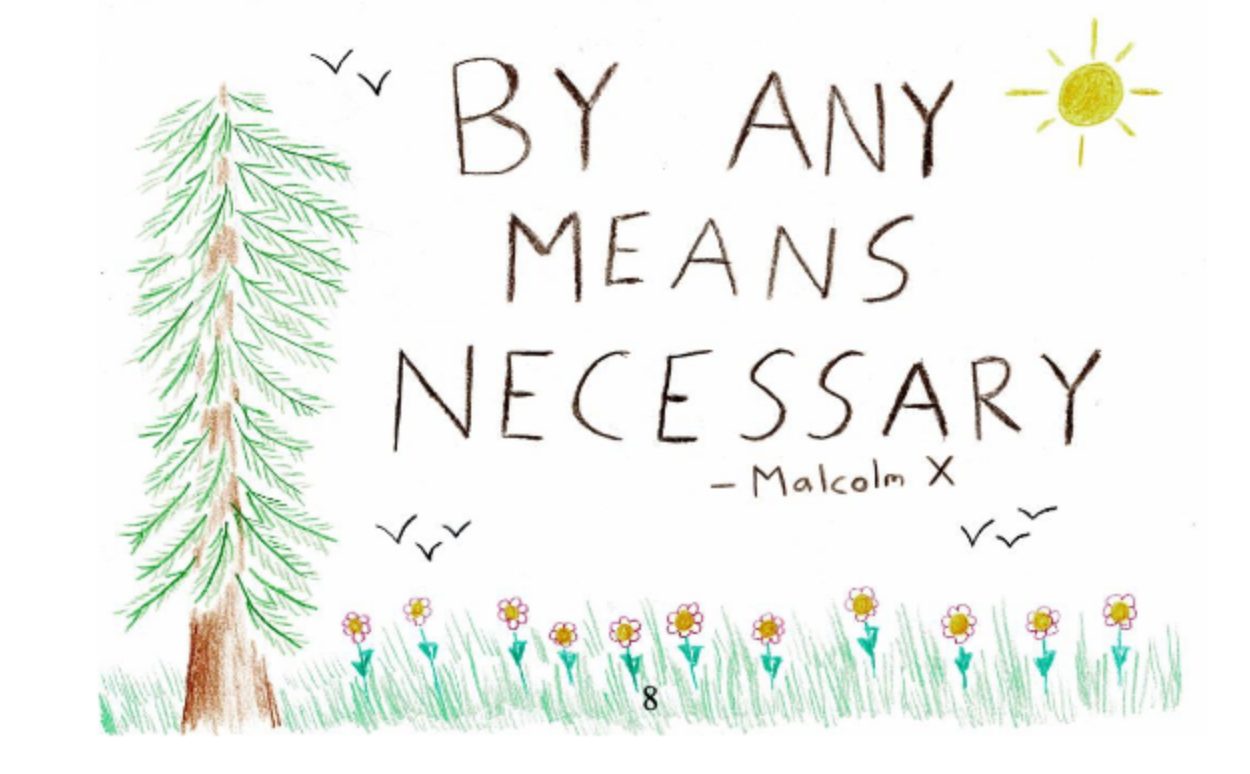
by DGR News Service | Nov 13, 2019 | Listening to the Land
Written and photographed by Beth Robson / Art for Culture Change
Human industrial civilization is killing the planet. This we know. How do we know? Because every square mile of ocean has at least 50,000 pieces of floating plastic in it, because we burn 3 million gallons of fossil fuels every minute, because 90 percent of the large fish in the ocean and half of the world’s forests are gone.
When people ask “How can we stop climate change?” what they are really asking is “How can we stop climate change without substantially changing how we live on the planet?” and the answer is: we can’t. That’s like asking how we can save the salmon and the Orcas without removing dams, stopping industrial logging, stopping industrial agriculture, stopping industrial fishing, stopping industrial plastics, and stopping climate change. Again, the answer is: we can’t.
So the right question to ask is not “How can we stop climate change?”, the right question to ask is “Where is my loyalty?” And if our answer to the question “Where is my loyalty” is anything other than “With nature” then we can’t expect life on this planet to go on much longer.
We cannot live and thrive on this planet without functioning ecosystems, without abundant biodiversity, without clean air and a healthy climate, without clean water, without intact forests. When we place our loyalty with nature, everything else falls into place. When we place our loyalty with nature, everything we must do to stop climate change, to save the Orcas, to save the salmon, to save the forests becomes crystal clear. When we place our loyalty with nature, stopping climate change is easy.
We civilized industrial humans abdicated our loyalty to nature a long time ago, when we began extracting more from nature than we give back, in order to accumulate capital. Now-a-days we call this capitalism. We forgot that “nature” is in fact our family, our relatives, our life blood, and began to think of nature as our property. After a while, we civilized beings became so infected with the sickness we know as capitalism that we even wrote laws protecting our right to nature as property. Most people now believe that we have the right to treat nature as our property, which often means we believe we have the right to use it and destroy it. But this “property” — meaning rivers, trees, soil, animals, earth, water, air — is not ours to own. Rivers, trees, soil, animals, earth, water, and air are beings in their own right. They have been here longer than us and they will be here long after we’re gone. They have just as much right as we do — perhaps even more so — to exist and to flourish on Planet Earth.
How dare we treat nature as property!
Upton Sinclair wrote that it’s hard to make a man understand something when his salary depends on him not understanding it. Every aspect of how our current industrial civilization operates on Planet Earth depends on our not understanding that the trees, the rivers, the salmon, the orcas, the air we breathe, the entire living earth, are all our relatives, and that our very lives depend upon theirs.
Well it’s time to wake up. It’s time to pay attention. It’s time to understand. Nature is not our property. We are nature. Nature is our life blood. Nature has the right to exist and flourish. It’s time to place our loyalty with nature.

by DGR News Service | Nov 6, 2019 | The Solution: Resistance
The DGR organization is largely based on the book Deep Green Resistance, which was written by Lierre Keith, Aric McBay, and Derrick Jensen and released in spring 2011.
Synopsis of the Book
Deep Green Resistance< starts where the environmental movement leaves off: industrial civilization is incompatible with life. Technology can’t fix it, and shopping—no matter how green—won’t stop it. To save this planet, we need a serious resistance movement that can bring down the industrial economy. Deep Green Resistance evaluates strategic options for resistance, from nonviolence to guerrilla warfare, and the conditions required for those options to be successful. It provides an exploration of organizational structures, recruitment, security, and target selection for both aboveground and underground action*. Deep Green Resistance also discusses a culture of resistance and the crucial support role that it can play. Deep Green Resistance is a plan of action for anyone determined to fight for this planet—and win
Read the Book
You can read Deep Green Resistance online for free, “name your donation” to download an ebook, or buy a physical copy of the book. We encourage you to buy the book directly from us, and not from Walmart, Amazon, etc. All proceeds from books purchased through the DGR website go directly to support the DGR aboveground organization.
Price $23 — includes free shipping (only within the U.S.). Click here to visit our store and buy the book. The book will ship in one to two weeks. Let us know if you’d like the book signed by Derrick Jensen and/or Lierre Keith.
Book Reviews
Words as Tactical Weapons (Canadian Dimension Magazine, 2012)
Other reviews:
“This book did not give me hope, but it did end my despair. Knowing that there is a subset of the population that, despite the enormity and seeming insurmountable scope of the destruction being wreaked on our planet, is willing to be brave enough to not only name the problems but DO something about it, has solidified a sense of purpose in myself. The mainstream environmental movement has always seemed somehow distracted, enamored with and addicted to the technological spectacle, making excuses for the continuation of our destructive civilization as long as there are impotent reforms and concessions – that ultimately mean nothing in the end. Deep Green Resistance identifies the problem and gives an outline of material solutions to stand up and fight for life, instead of either the magical thinking or nihilistic despair that is so prevalent in today’s environmental movements.”
– NH
“It took me two years to finish this book, because no sentence is wasted, every word written is heavy with meaning and import. I don’t agree with every detail, but I agree with so very much it had me shaking my head and underlining every other sentence. This book says things a lot of us know and think and never dare say: EXACTLY how bad things are, and who the REAL enemy is, with no false hope and no sugarcoating. A should-read for everyone.”
– FE
“This book is important for those who are aware of the many crises on the near horizon brought about by climate change. This book gives an action plan built upon love for the web of life and grounded in awareness that our current social structures (business and government) will not sufficiently change to avoid a cataclysm. The difficulty of it is that after reading, you have less of an excuse to not act.”
– KB
“Jensen, Keith, and McBay have written a clear call to arms for the health and well-being of the planet. They pointedly note the ineffectiveness of mere protest and reveal that only radical direct action has ever resulted in social change. But, more to the point, they note that they are not reforming the system, claiming it is merely flawed and in need of minor tweaks, nor do they envision an alternative consumerist industrialized society. They call for the end to the omnicidal culture that is systemically destroying the world and all of its inhabitants.
The case they make is unassailable if honestly argued. I know that those in thrall to the corporate killing machine will form a defense, but any honest person who carries the equation out to its logical end will come to the same understanding as these three avant garde thinkers.
If you have protested and been frustrated by the lack of results, if you’ve confronted and been ignored, if you’ve used every tactic that incrementalists deem appropriate and still feel as though you are losing ground (because you are), or if you merely want to understand why things are the way they are and seem to be getting worse, get this book. Read it. Read it again. Give it to your friends, your family, your co-workers, to everyone.
Remember, they are few, and we are many. Do it now before it is too late.”
– RD

by DGR News Service | Nov 1, 2019 | Colonialism & Conquest
By Max Wilbert
As the world moves further into a state of climate crisis, it’s imperative that we study and critique the strategies being proposed to address greenhouse gas emissions, and develop our own strategies based on rigorous assessment of their effectiveness.
Many of the strategies currently being pursued by the mainstream environmental movement hinge on courts and on legislative change. This article will examine one these strategies—the “climate trust” lawsuits brought by the group Our Children’s Trust—in some detail. First, however, we must review a basic framework of how the court system, and more fundamentally, the legal system in general, serves ruling class interests within capitalism.
From early English laws like the Statutes of Merton and Westminster that authorized enclosure of the commons, to the Papal Bull “Inter Caetera” in 1493 which authorized the Doctrine of Discovery and the conquest and colonization of non-Christian lands west of the Azores, law within capitalism has always been an exercise in justifying systematic theft.
These ancient foundations continue to underlie law. For example, in the United States the Johnson v. M’Intosh Supreme Court case of 1823 is regarded as the foundation of modern property law and studied by nearly every law student. In the unanimous decision, Chief Justice John Marshall wrote that “the whole theory of their titles to lands in America, rests upon the hypothesis, that the Indians had no right of soil as sovereign, independent states. Discovery is the foundation of title, in European nations, and this overlooks all proprietary rights in the natives.”[i]
What is the Purpose of Law within Capitalism?
French Liberal School economist and laissez faire advocate Frederic Bastiat provided one of the most concise definitions of law within capitalism. “When plunder becomes a way of life for a group of men in a society,” he wrote in 1850, “over the course of time they create for themselves a legal system that authorizes it and a moral code that glorifies it.”[ii]
With this statement, Bastiat was attempting to critique socialism and collectivist tendencies. Marx, a contemporary of Bastiat, called him “The shallowest and therefore the most successful representative of the apologists of vulgar economics.” But Bastiat has inadvertently provided a functional description of law within capitalism.
In a similar manner, the free-market advocate, New York Times columnist, and Iraq War crusader Thomas Friedman inadvertently described the link between imperialist warfare and free-market capitalism perfectly when he wrote in the New York Times Magazine in 1999 that “[t]he hidden hand of the market will never work without the hidden fist. McDonald’s cannot flourish without McDonnell Douglas. And the hidden fist that keeps the world safe for silicon valley’s technologies to flourish is called the US army, air force, navy, and Marine Corps.”[iii]
Friedman’s piece argued for “sustainable globalization” which “cannot be maintained without the active [military] involvement of the United States,” and explicitly argued for increased cooperation between U.S. corporations and military.
The Institutionalization of Organized Theft
Critics of globalized capitalism agree with Friedman’s linkage of corporate power and military hegemony, but to borrow Bastiat’s term, see these entities as facilitating the plunder that defines modern capitalism, not ushering in Friedman’s neoliberal fantasy. Military aggression and economic colonization were the foundation of imperial power in Bastiat’s time, just as they are today. Today’s capitalist societies have evolved their methods. Instead of legalized chattel slavery,[iv] the United States now has a slave-like prison system and the global economy is fully dependent on systematic labor exploitation. Some of the most lasting impacts of globalization include the outsourcing of jobs to poor nations with artificially deflated labor costs, the outsourcing of pollution to what Lawrence Summers called “underpolluted” nations, and the explosion of international trade. All of this is facilitated by the IMF and World Bank, which leverage development loans to systematically privatize the wealth and dismantle social and environmental regulations within poor nations. Altogether, this organized theft leads to an average wealth transfer of roughly $2 trillion per year from poor countries to rich countries, not counting externalities.[v]
The accelerating extraction of wealth from the poor has been matched by similar growth in destructive theft from the planet. Extraction of primary resources—timber, foodstuffs, ore, fossil fuels, water, etc.—has tripled over the past 40 years to more than 70 billion tonnes annually.[vi] Greenhouse gas emissions have doubled since 1980, and more than 1 million species are threatened with extinction, threatening to unravel the ecological basis of life on this planet.[vii] Human disconnection from the natural world is at an all-time high as business privatizes even our most intimate private lives with pornography, dating apps, and ubiquitous data gathering.
By realistic economic measures, the owners of society are wealthier than ever and inequality is reaching record levels.[viii] And as Bastiat described, this arrangement of power is undergirded by a legal structure that authorizes and glorifies this exploitation.
The United States—still the epicenter of imperial power, despite a steady decline in influence since the invasion of Afghanistan in 2001—provides illustrative examples. The extraction of profits from workers and the land is the bedrock principle of American law. The idea that workers should be in control of their own communities and benefit from the work they and their neighbors do is not even a topic of discussion in courtrooms and legislative halls. Nature is owned and managed as property. The idea that nature should be respected as the source of all human goods and life is, at best, commodified into the ideology of “natural capitalism”, while true deep ecology ideals—that nature exists and has value for it’s own sake, on it’s own terms—remain fringe positions.
The Legal System as an Arena of Political Change
Movements for justice have always used the legal system and the courts as arenas of political struggle. The Civil Rights movement, the Feminist movement, the Labor movement, and the Environmental movement have all won significant victories in courtrooms. The feminist legal scholar Catherine MacKinnon, who is credited with the legal recognition of sexual harassment as a form of sex discrimination, wrote in collaboration with Andrea Dworkin that “law organizes power.”[ix]
Given the current supremacy of the capitalist state, the courts are an important arena of political struggle. To concede this legal battleground to reactionaries could be suicidal. But to rely only on legal methods is also a flawed strategy. Legal reform has never proved able to do more than slow the progression of capital’s death march.
The Voting Rights Act has now been dismantled, reversing a key gain of the Civil Rights Movement.[x] Roe v. Wade, which established Federal legality of abortion, has been under incessant attack for decades. Countless state laws have closed abortion clinics, limited funding, and attacked the principle of female bodily autonomy via more than 400 laws in the last 9 years alone.[xi] With the new Supreme Court, it’s likely Roe will be completely overturned. The Clean Water Act is currently being gutted.[xii] Union membership is at an all-time low as “right-to-work” laws proliferate, undermining the effectiveness of even bourgeois workplace organizing efforts.[xiii] This reflects global efforts to undermine minimum wages and other basic labor protections.[xiv]
Recently, environmentalists in the United States and elsewhere are testing a set of innovative legal strategies. These include the group “Our Children’s Trust,” which is filing lawsuits against the federal government for failing to uphold the “public trust doctrine,” a legal principle that the government is responsible for managing public resources for the benefit of the public. Our Children’s Trust is attempting to expand the purview of the trust doctrine to include the climate, and thus potentially force the U.S. government to fight climate change.
But the flaw in this plan is obvious right away: the U.S. government, like all capitalist states, has never existed to wisely steward public resources, but rather to facilitate their exploitation for private gain. In truth, even most socialist states have fallen victim to industrial arms races with capitalist societies or to an industrial productivism that values development of industry as the highest good, and have thus fallen well short of this ideal.
Rights of Nature, the Trust Doctrine, and The Necessity Defense
The trust doctrine approach is just one of the innovative legal strategies being pursued by the environmental movement today. Two others are the Rights of Nature movement, and the push for the “climate necessity defense.” The rights of nature movement seeks to expand basic rights, such as personhood, to non-human ecosystems. The necessity defense is the legal principle that it is sometimes legal to break the law in order to prevent a greater harm; the classic example is breaking a window to save a child from a home that is on fire. It has been used to defend protestors in a few high-profile cases of civil disobedience.[xv]
These legal strategies aim to advance ecological struggles by providing protections for ecosystems, by forcing changes in U.S. and international law to curtail global warming, and by protecting political dissidents.
Can they succeed? And what would success look like?
I argue that these efforts, while laudable, will not lead to significant change because of structural barriers. For example, let’s imagine that the “Our Children’s Trust” lawsuit was successful, and U.S. courts recognized the obligation of the federal government to safeguard climate stability, and ordered emissions reductions of, for example, 80 percent by 2030 and 100 percent by 2050. And let’s suppose they choose to implement the methods proposed by Our Children’s Trust.
Our Children’s Trust proposes a three-pronged strategy for halting global warming.[xvi] First, they call for 100 gigatons of carbon sequestration via reforestation, perennial agriculture, and soil conservation. Second, they call for reducing emissions by “designing our cities for walking and biking, investing in mass transit, constructing high-performance energy efficient buildings, transitioning to 100% clean energy, shifting to green manufacturing and durable products, and adopting restorative forestry and farming practices.” Finally, they propose fees on carbon pollution and ending subsidies to the fossil fuel industry.
Their first category of solutions is admirable, as long as “reforestation” is not twisted to mean expanding the monocrop plantations of industrial forestry. But as I exhaustively detail in my forthcoming book Bright Green Lies, their second category, technological solutions, is woefully insufficient for addressing global climate destabilization.
The Failure of Green Technology
According to the work of sociologist Richard York, renewable energy today rarely actually displaces fossil fuels. Instead, predictably, these energy sources are typically added on top of existing sources, helping to grow the capitalist economy. York writes that “Non-hydro renewable [energy] sources have a positive coefficient, indicating the opposite of displacement, but this coefficient is not significantly different from 0, indicating that renewables tend to simply be added to the energy mix without displacing fossil fuels.”[xvii] Another study in China had similar results, finding that “Non-hydro alternative energy did not show statistically significant displacement effect in any of the six regional grids.”[xviii]At a global level (which is ultimately the only significant scope for global warming), the burning of coal, oil, and gas has grown significantly even as wind and solar have boomed.[xix]
After five years of research, one climate solutions lab found that even “a wholesale adoption of renewable energy… would not have resulted in significant reductions of carbon dioxide emissions” and concluded that “Trying to combat climate change exclusively with today’s renewable energy technologies simply won’t work.”[xx]
Socialists have long argued that centralized planning and the lack of a growth imperative would allow non-capitalist societies to adopt new technologies cautiously and rationally. This remains a largely untested hypothesis in our era of global ecological crisis, but regardless, this is not what Our Children’s Trust is promoting. Instead, they chose to promote unproven and extremely expensive carbon capture technology (as one recent headline reads, “Best Carbon Capture Facility In World Emits 25 Times More CO2 Than Sequestered”[xxi]), electric cars, and energy efficiency which hasn’t made a dent in growth in consumption. In truth, efficiency within capitalism is almost certain to lead to Jevon’s Paradox: more profit, more investment, and more growth in resource use.[xxii]
“Green Cities” and Market Failures
Even dense, walkable cities—a favorite of “green growth” and de-growth advocates alike probably represent an illusory solution. As urban planning professor Michael Neuman succinctly explains, “Since 1960, while human population has doubled [and the majority of the world’s population has moved to cities], the global economy has quadrupled, and resource consumption quintupled,” he says. “Thus, we are getting less efficient and less sustainable as we move to cities, not more, contrary to popular belief and professional dogma.”[xxiii] Study after study from locations as widely spaced as Iran, Taiwan, and the Netherlands have shown little or no reduction in energy consumption resulting from increased urban density.
As with other market-based measures for environmental protection, carbon tax schemes have been almost completely ineffective in lowering emissions. For example, the European market is flooded with allowances, and has at best reduced emissions by 2 or 3 percent across the continent.[xxiv] At worst, it has simply incentivized pollution outsourcing and “carbon laundering” as seen most prominently in the Volkswagen emissions case.
Given these realities, even a positive ruling in the Our Children’s Trust case wouldn’t significantly slow or stop global climate destabilization. Direct approaches, like stopping fossil fuel extraction, are not discussed in their strategy, and there is no critique of capitalism apparent either.
Some proponents argue that major policy proposals like The Green New Deal or lawsuits like the Our Children’s Trust cases represent organizing focal points which expand the scope of acceptable debate.[xxv] This is certainly true. But while false solutions to the problems of capitalism are always acceptable to ruling class, they will never solve the problems they purport to address. It is past time to build explicitly anti-capitalist organizations to address the ecological crisis, and to arm them with effective (read: revolutionary) methods.
The Necessity of Dismantling Industrial Capitalism
The reason Our Children’s Trust isn’t tackling this issue is likely the same reason The Green New Deal didn’t include a proposal to shut down the fossil fuel industry. As Brad Hornick writes in Resilience, “[Stopping anthropogenic climate disruption] implies a radical retrenchment or collapse of the dominant industries and infrastructure based upon fossil fuel production, including automobiles, aircraft, shipping, petrochemical, synthetic fabrics, construction, agribusiness, industrial agriculture, packaging, plastic production (disposables economy), and the war industries.”
In other words, stopping climate chaos requires an end to capitalism, to much of the global economy, and to U.S. hegemony. This is not popular in society, nor is it politically acceptable—even thinkable—in courtrooms. The U.S. court system will never order the dismantling of the global economy and of U.S. empire. In the 19th century, Mikhail Bakunin wrote that “The supreme law of the State is self-preservation at any cost.” This remains true today.
Legally speaking, judges can rule anything they want, as long as they can justify it using legal precedent. But there are also specific legal and doctrinal barriers that confine all judges who sincerely believe in the structure of American law. Namely, as mentioned earlier, the notion that nature is property, that property can be rightfully destroyed or consumed by its owner, and the principles of corporate rights all stand in the way in the significant legal change. Further, even favorable court rulings would depend on the Executive and Legislative branches of the U.S. government, as well as on police, military, and other Federal employees, to enforce such a legal shift.
To rely on the law alone is to concede to a never-ending tug of war—an endless battle which the ruling class wages using billions in lobbying dollars. But institutions are not monolithic. Ideological power struggles within them can change the material conditions for resistance taking place within the broader culture. And there is some promise in all of these legal strategies. For example, the Rights of Nature approach has the possibility to instill a new, fundamental respect for the integrity of the natural world throughout certain populations. The climate necessity defense approach has promise for protecting activists who engage in non-violent direct action (which we should note has been thus far entirely ineffective in stopping the murder of the planet). Therefore, the promise these new legal approaches represent is primarily cultural. In military terminology, these are shaping actions, not decisive ones.[xxvi]
Reform Will Not Halt The Crisis
These legal strategies may change the framing conditions and lead to reform. But as the last 50 years can attest, reforms will not be enough to halt the ecological crisis. At worst, ill-fated movements can divert valuable resources and energy into dead-end efforts. Left historians do not look kindly on Nelson Mandela’s pro-capitalist turn late in life, but he articulated an important consideration when he justified his decision to create the Unkhonte We Sizwe, an armed underground insurgency, writing that “There is no moral goodness in using an ineffective weapon.”[xxvii]
Modern movements would do well to consider this.
David Brower, the founder of Earth Island Institute and Friends of the Earth, and former director of the Sierra Club once said, “All I have done in my career is to slow the rate at which things get worse.” In this historical moment, we don’t have time to merely slow the destruction. We need to rapidly halt it and to reverse it. This means choosing effective methods, and at a minimum, dismantling capitalism.
The struggle to halt the ecological crisis will not be primarily fought in courtrooms, legislated by policymakers, sold by corporations, or decided by foundation-funded NGOs. It will be fought by people’s movements and by revolutionaries who are willing to fight for the survival of the human species and the global community of biotic life. That’s something that the courts will never do.
Max Wilbert is an organizer, writer, and wilderness guide who grew up in Seattle’s post-WTO anti-globalization and undoing racism movement. He been involved in campaigns against sexual violence, destruction of the planet, and racism for 18 years.
This work is licensed under a Creative Commons Attribution-NonCommercial-ShareAlike 4.0 International License.
Featured image: Jared Rodriguez / Truthout, CC BY-NC-ND 2.0.
References
[i] Johnson v. M’Intosh, 21 U.S. 543 (1823)
[ii] Frederick Bastiat. The Law. 1850.
[iii] Thomas L. Friedman. “A Manifesto for the Fast World.” New York Times Magazine (March 28, 1999).
[iv] Although it should be noted there are an estimated 40 million literal slaves in the world today, mostly in forced manual labor, service industries, and sexual slavery.
[v] Intan Suwandi, R. Jamil Jonna, and John Bellamy Foster. “Global Commodity Chains and the New Imperialism.” Monthly Review 70, no. 10 (March 2019): 1-24.
[vi] “Worldwide Extraction of Materials Triples in Four Decades, Intensifying Climate Change and Air Pollution.” International Resource Panel, U.N. Environmental Programme (20 July 2016).
[vii] “Media Release: Nature’s Dangerous Decline ‘Unprecedented’; Species Extinction Rates ‘Accelerating.’” Intergovernmental Science-Policy Platform on Biodiversity and Ecosystem Services (May 6, 2019).
[viii] Jason Hickel. “Global inequality may be much worse than we think.” The Guardian (April 8, 2016).
[ix] Andrea Dworkin and Catherine A. MacKinnon. Pornography and Civil Rights: A New Day for Women’s Equality (Minneapolis: Organizing Against Pornography, 1988).
[x] “Voting Rights Act Dismantled by Supreme Court.” Democracy Chronicles (June 25, 2013)..
[xi] “Roe v. Wade: The Constitutional Right to Access Safe, Legal Abortion.” Planned Parenthood Action Fund.
[xii] Michelle Chen. “Trump Moves to Gut the Clean Water Act.” The Nation (December 13, 2018).
[xiii] Gordon Lafer. “The Legislative Attack on American Wages and Labor Standards, 2011–2012.” Economic Policy Institute (October 31, 2013).
[xiv] Subodh Varma. “World Bank: abolish minimum wage, other labour laws.” Monthly Review Online (April 24, 2018).
[xv] Andrew Buncombe. “Anti-pipeline campaigners found not guilty by judge because ‘protest against climate change crisis’ was legal ‘necessity.’” The Independent (March 27, 2018).
[xvi] “Pathway to Climate Recovery.” Our Children’s Trust.
[xvii] Richard York. “Do alternative energy sources displace fossil fuels?” Nature Climate Change 2 (2012): 441-443.
[xviii] Yuanan Hu and Hefa Cheng. “Displacement efficiency of alternative energy and trans-provincial imported electricity in China.” Nature Communications 8 (2017): 14590.
[xix] Barry Saxifrage. “Fossil fuel expansion crushes renewables.” National Observer (September 20, 2017).
[xx] Ross Koningstein and David Fork. “What It Would Really Take to Reverse Climate Change.” IEEE Spectrum (November 18, 2014).
[xxi] Michael Barnard. “Best Carbon Capture Facility In World Emits 25 Times More CO2 Than Sequestered.” CleanTechnica (June 12, 2019).
[xxii] John Bellamy Foster, Brett Clark and Richard York. “Capitalism and the Curse of Energy Efficiency.” Monthly Review 62, no. 6 (November 1, 2010).
[xxiii] Alan Oakes. “Revisiting Neuman’s ‘Compact City Fallacy.’” Green Building and Design Magazine (2013).
[xxiv] “The EU Emissions Trading System.” European Commission Climate Action (July 22, 2016).
[xxv] Carol Dansereau, John Foran, Ted Franklin, Brad Hornick, Sandra Lindberg, Jennifer Scarlott. “One, Two, … Many Green New Deals: An Ecosocialist Roundtable.” Resilience (February 26, 2019).
[xxvi] “ADP 3-0. Unified Land Operations.” Department of the Army (2011).
[xxvii] Nelson Mandela. Long Walk to Freedom (Little Brown & Co., 1994).





